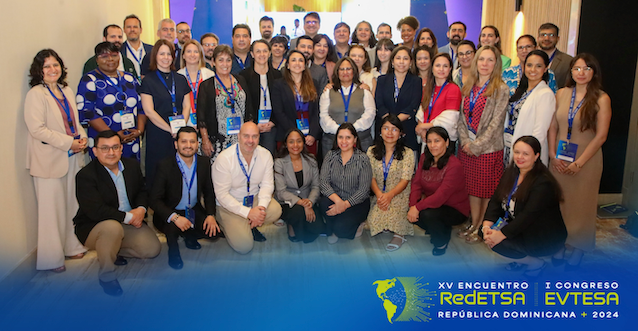
Santo Domingo, November 6, 2024 (PAHO) - The Pan American Health Organization (PAHO), through its Departments of Innovation, Access to Medicines, and Health Technologies (IMT), as the Secretariat of the Health Technology Assessment Network of the Americas (RedETSA), held the XV Regional Meeting of RedETSA.
The opening of the event was led by the Minister of Public Health of the Dominican Republic, Víctor Atallah; Minister of Labor, Luis Miguel De Camps; the General Manager of the National Social Security Council (CNSS), Edward Guzmán; Superintendent of Health and Occupational Risks (SISALRIL), Miguel Ceara Hatton. Additionally, the representative of PAHO/WHO in the Dominican Republic, Alba María Ropero Álvarez, and the Acting Head of the Access to Medicines and Health Technologies Unit of PAHO/WHO, Alexandre Lemgruber, were present.
The opening conference was delivered by Judit Rius, Director of the Department of Innovation, Access to Medicines, and Health Technologies, who spoke about the importance of HTA processes to support evidence-based decision-making and access to effective and quality health technologies.
The objective of the meeting was to promote the discussion around Health Technology Assessment (HTA) through the exchange of experiences among specialists and managers from the Region of the Americas. In this event, fundamental processes related to HTA at different points in the technology lifecycle, as well as other key relevant topics, were addressed.
One of the current challenges for the countries of the Region is the construction of integrated health systems, with quality care, equity, and efficiency. In this context, the development of HTA is fundamental for the generation of quality evidence that informs health decision-making as well as its effective implementation and compliance monitoring. Furthermore, the links between HTA and decision-making processes are key to generating a real impact on health systems. To date, the countries of the Region have established HTA with different levels of development and institutionalization.
Effective application of HTA, from an integrated approach that considers the entire lifecycle of health technologies, requires that the components associated with the decision-making process – from assessment to implementation and monitoring of its use – be explicitly integrated and coordinated.
The meeting included an open scientific program on November 6 and 7 with speakers from 20 countries, free workshops on the afternoon of November 7 taught by specialists, network members, and collaborators on “Equity in HTA,” “Grade Methodology,” and “Economic Evaluation,” as well as the annual meeting of RedETSA members, held on November 8.
The international event had the participation of more than 300 people from 25 countries, who debated and committed to advancing the institutionalization and strengthening of the HTA process to ensure access to safe and effective medicines and other health technologies and collaborate with the sustainability of the health systems in our region. The closed meeting of members had the participation of 55 people from 19 countries in the region corresponding to 37 member institutions of RedETSA where the main advances and challenges of the member institutions in the institutionalization of HTA, the network’s activities carried out during 2024, and the 2025 work plan were shared.
For more information and event videos, click here.




